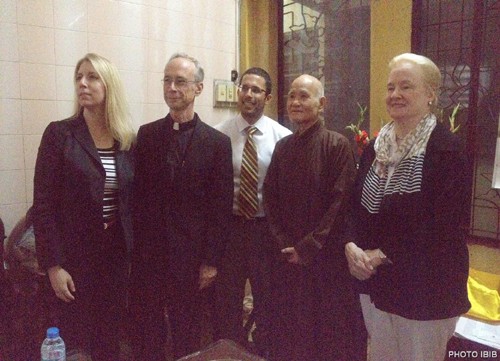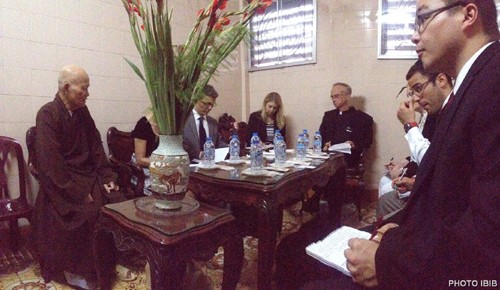PARIS, 27 August 2015 (IBIB) – On Tuesday 25 August, a delegation from the US Commission on International Religious Freedom (USCIRF) visited the Most Venerable Thich Quang Do, prominent dissident and Patriarch of the Unified Buddhist Church of Vietnam, at the Thanh Minh Zen Monastery in Ho Chi Minh City (Saigon), where the Buddhist leader is under effective house arrest.
The USCIRF delegation included Commissioner Mary Ann Glendon, former US Ambassador to the Holy See, Comissioner Daniel I. Mark, Commissioner Rev. Thomas J. Reese, S.J. and Ms. Tina Mufford, USCIRF Policy analyst for East Asia-Pacific. They were accompanied by Charles Sellers, Political Section Chief at the US Consulate General and David Muehlke, Human Rights officer at the US Embassy in Hanoi.
 |
|
|
USCIRF delegation, from left to right: Tina Mufford, Commissioner Reese, Commissioner Mark, Patriarch Thich Quang Do, Commissioner Mary Ann Glendon, 25.8.2015
|
The USCIRF members questioned Thich Quang Do about the situation of the Unified Buddhist Church (UBCV), which is not recognized by the Communist authorities in Vietnam. Patriarch Thich Quang Do described the daily harassments, threats and restrictions imposed upon UBCV monks, nuns and lay-followers all over the country, and the repression against the UBCV-affiliated Buddhist Youth Movement, whose leader Le Cong Cau has been repeatedly banned by Police in recent months from travelling from his home in Hue to meet diplomatic delegations. Regarding his own situation, Thich Quang Do, 87, said that the Thanh Minh Zen Monastery “has been my whole universe for almost fifteen years. In 2001, I was detained incommunicado here for two years for launching an appeal for democracy and human rights. On my release in 2003, the authorities again condemned me to house arrest, this time on verbal orders, without any formal charge. I have remained here ever since, a prisoner in my own pagoda”.
But Thich Quang Do stressed that his situation was not unique: “All civil society activists, journalists, human rights defenders, religious followers or political dissidents who dare to speak out for human rights face harassment, intimidation, surveillance or detention. Plain-clothed security agents ruthlessly beat young men and women in order to frighten them and reduce them to silence”. Vietnam is perceived as a blooming economy and attractive tourist haven, he said, “yet beneath this thin veneer of legitimacy lies a dark, silent world of repression, violence and fear. Vietnam has opened its economy, but it remains a one-Party, totalitarian state”.
 |
|
|
Patriarch Thich Quang Do describes the situation of the UBCV to the US Commission on International Religious Freedom, 25.8.2015
|
The UBCV leader told the delegation that religious communities were a primary target of repression because they remained independent of the ruling powers: “In Vietnam, the religious communities, especially Buddhism, Vietnam’s majority religion, are the strongest independent voices of civil society. For the past forty years, the authorities have sought to suppress the Unified Buddhist Church of Vietnam, harassing our members, detaining and even murdering our leaders, and outlawing our activities. Yet we have survived, and we will continue to do so, whatever price we have to pay”.
In his recommendations to USCIRF, Patriarch Thich Quang Do urged them to seize the opportunity of the National Assembly’s debate on reforming the Criminal Code to press for the repeal of vaguely-worded “national security” provisions such as article 79, 87, 88 or 258 which are invoked to detain peaceful critics, bloggers and religious followers;
The UBCV leader also recalled the observation of Dr. Heiner Bielefeldt, UN Special Rapporteur on Freedom of Religion or Belief who visited him last July, that the autonomy of independent, “non-recognized religions” was the litmus test of religious freedom in Vietnam. He urged USCIRF to “urgently press Vietnam to re-establish the legal status of the Unified Buddhist Church of Vietnam, release all our detained members, and guarantee our full freedom of religious activity. Then, we can actively contribute to the economic, social and spiritual development of our country”.
Created under the 1998 International Religious Freedom Act, US Commission on International Religious Freedom is an independent, bipartisan government advisory body that monitors religious freedom worldwide and makes policy recommendations to the US President, Secretary of State, and Congress. In its Annual Report in April 2015, USCIRF recommended that Vietnam be designated as a “Country of Particular Concern” for its “systematic, ongoing and egregious violations” of freedom of religion or belief.
 Quê Me Quê Me: Action for democracy in Vietnam & Vietnam Committee on Human Rights
Quê Me Quê Me: Action for democracy in Vietnam & Vietnam Committee on Human Rights



